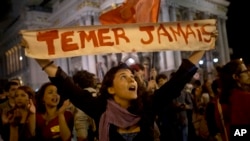President Michel Temer's approval ratings are sinking as he pushes austerity measures through Brazil's Congress while the popularity of leftist former president Luiz Inacio Lula da Silva is rebounding ahead of 2018 elections, an opinion poll showed Wednesday.
The survey by pollster MDA also showed right-wing politician Jair Bolsonaro, an apologist for Brazil's 1965-1984 dictatorship, making gains against centrist candidates in the polarized 2018 presidential race.
Ten months after he took over from impeached leftist Dilma Rousseff, conservative Temer is trying to push unpopular reforms through Congress to tame Brazil's budget deficit and restore business confidence amidst a two-year-long recession.
Temer's standing has been hurt by new corruption allegations against leaders of his PMDB party and members of his cabinet.
The number of Brazilians who consider Temer's government "bad" or "terrible" has increased to 44.1 percent from 36.7 percent in an October survey, while those who rate it as "great" or "good" has fallen to 10.3 percent from 14.6 percent.
Disapproval of the way Temer himself is governing has risen to 62.4 from 51.5 percent in October, MDA said.
Lula, founder of the Workers Party and Brazil's president from 2003-2010, comfortably leads a field of potential candidates in simulated second-round runoff votes for 2018, defeating former 2014 presidential candidates Aecio Neves and Marina Silva, the opinion poll showed.
Lula would thrash Temer if he ran for re-election by the widest margin, 42.9 percent vs. 19.0 percent, MDA said.
Surveys last year showed that at that time Lula, Brazil's first working-class president, would have been defeated in a runoff.
However, the main hurdles to Lula running again were five corruption investigations, since he would be barred from contesting the election if he were convicted and lost a first appeal.
Bolsonaro, an anti-gay evangelical conservative with a hardline stance on crime and drugs, is running behind Lula and Silva, but competing for third place with Neves in first-round vote simulations, the MDA survey showed.
MDA surveyed 2,002 people for four days starting on Feb. 8.
The poll has a margin of error of 2.2 percentage points. It was commissioned by the national transport lobby CNT.










